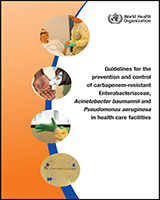The Department of Service Delivery and Safety of the World Health Organization (WHO) gratefully acknowledges the contributions that many individuals and organizations have made to the development of these guidelines.
Overall coordination and writing of the guidelines
Benedetta Allegranzi and Sara Tomczyk (Department of Service Delivery and Safety, WHO) coordinated the development of the guidelines and contributed to the writing process. M. Lindsay Grayson (Austin Health and University of Melbourne, Australia) led the writing of the guidelines and contributed to the interpretation of the evidence to feed into the guidelines’ content. Rosemary Sudan and Hiroki Saito provided professional editing and final review assistance. Revekka Vital provided professional graphic design assistance.
WHO Guidelines Development Group (GDG)
The chair of the GDG was M. Lindsay Grayson (Austin Health and University of Melbourne, Australia).
The GRADE methodologist of the GDG was Matthias Egger (University of Bern, Switzerland).
The following experts served on the GDG:
George L. Daikos (Laikon and Attikon Hospitals, Greece), Petra Gastmeier (Charité Universitätsmedizin, Germany), Neil Gupta (Centers for Disease Control and Prevention [CDC], United States of America [USA]), Ben Howden (The Peter Doherty Institute for Infection and Immunity, University of Melbourne and Austin Health, Australia), Bijie Hu (Chinese Infection Control Association, China), Kushlani Jayatilleke (Sri Jayewardenapura General Hospital, Sri Lanka), Marimuthu Kalisvar (Tan Tock Seng Hospital and National University of Singapore, Singapore), Anna-Pelagia Magiorakos (European Centre for Disease Prevention and Control, Sweden), Shaheen Mehtar (Infection Control Africa Network and Stellenbosch University Faculty of Health Sciences, South Africa), Maria Luisa Moro (Agenzia Sanitaria e Sociale Regionale, Regione Emilia-Romagna, Italy), Babacar Ndoye (Infection Control Africa Network, Senegal), Folasade Ogunsola (College of Medicine, University of Lagos, Nigeria), Fernando Otaíza (Ministry of Health, Chile), Pierre Parneix (Centre de Coordination de Lutte contre les Infections Nosocomiales Sud-Ouest [South-West France Health Care-Associated Infection Control Centre] and the Société Française d’Hygiène, Hôpital Pellegrin, France), Mitchell J. Schwaber (National Center for Infection Control of the Israel Ministry of Health; Sackler Faculty of Medicine, Tel Aviv University, Israel), Sharmila Sengupta (Medanta - The Medicity Hospital, India), Wing-Hong Seto (WHO Collaborating Centre for Infectious Disease Epidemiology and Control, Hong Kong SAR, China), Nalini Singh (Children’s National Medical Center and George Washington University, USA), Evelina Tacconelli (University Hospital Tübingen, Germany), Maha Talaat (CDC Global Disease Detection Programme, Egypt), Akeau Unahalekhaka (Chiang Mai University, Thailand).
WHO Steering Group
The following WHO experts served on the WHO Steering Group:
Benedetta Allegranzi (Department of Service Delivery and Safety), Sergey Eremin (Antimicrobial Resistance Secretariat), Bruce Gordon (Water, Sanitation and Hygiene), Rana Hajjeh (WHO Regional Office for the Eastern Mediterranean), Valeska Stempliuk (WHO Regional Office for the Americas), Elizabeth Tayler (Antimicrobial Resistance Secretariat).
Systematic Reviews Expert Group
Stephan Harbarth (Geneva University Hospitals and Faculty of Medicine/WHO Collaborating Centre on Patient Safety, Switzerland), Sara Tomczyk (Department of Service Delivery and Safety, WHO), and Veronica Zanichelli (Geneva University Hospitals, Switzerland) led the systematic review. The following individuals contributed to the systematic review: Mohamed Abbas (Geneva University Hospitals/WHO Collaborating Centre on Patient Safety, Switzerland), Daniela Pires (Geneva University Hospitals/WHO Collaborating Centre on Patient Safety, Switzerland), Anthony Twyman (Department of Service Delivery and Safety, WHO). Tomas John Allen (Library and Information Networks for Knowledge, WHO) provided assistance with the searches for systematic reviews.
External Peer Review Group
Silvio Brusaferro (EUNETIPS, Udine University Hospital, Italy), An Caluwaerts (Médecins Sans Frontières [Doctors Without Borders], Belgium), Garance Fannie Upham (World Alliance Against Antibiotic Resistance, France, and WHO Patients for Patient Safety network), Jean-Christophe Lucet (Hôpital Bichat – Claude Bernard, France), María Virginia Villegas (Centro Internacional de Entrenamiento e Investigaciones Médicas, Colombia).
Acknowledgement of review by WHO Public Health Ethics Consultation Group
WHO Public Health Ethics Consultation Group, in particular: Evelyn Kortum (co-chair), Anaïs Legand, Dermot Maher (co-chair), Andreas Reis (secretary), and Rebekah Thomas Bosco.
Acknowledgement of financial support
Funding for the development of these guidelines was mainly provided by CDC in addition to WHO core funds. However, the views expressed do not necessarily reflect the official policies of CDC.

